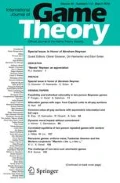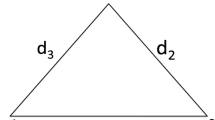Abstract
This paper examines coalition formation problems from the viewpoint of mechanism design. We consider the case where (i) the list of feasible coalitions (those coalitions which are permitted to form) is given in advance; and (ii) each individual’s preference is a ranking over those feasible coalitions which include this individual. We are interested in requiring the mechanism to guarantee each coalition the “right” of forming that coalition at least when every member of the coalition ranks the coalition at the top. We name this property coalitional unanimity. We examine the compatibility between coalitional unanimity and incentive requirements, and prove that if the mechanism is strategy-proof and respects coalitional unanimity, then for each preference profile, there exists at most one strictly core stable partition, and the mechanism chooses such a partition whenever available. Further, the mechanism is coalition strategy-proof and respects coalitional unanimity if, and only if, the strictly core stable partition uniquely exists for every preference profile.
Similar content being viewed by others
References
Banerjee S, Konishi H, Sönmez T (2001) Core in a simple coalition formation game. Soc Choice Welf 18: 135–153
Bogomolnaia A, Jackson MO (2002) The stability of hedonic coalition structures. Games Econ Behav 38: 201–230
Cechlárová K, Romero-Medina A (2001) Stability in coalition formation games. Int J Game Theory 29: 487–494
Dréze J, Greenberg J (1980) Hedonic coalitions: optimality and stability. Econometrica 48: 987–1003
Gale D, Shapley L (1962) College admissions and the stability of marriage. Am Math Monthly 69: 9–15
Knuth D (1976) Mariages stables et leurs relations avec d’autre problèmes combinatoires. Les Presses de l’université de Montréal, Montreal
Ng C, Hirschberg D (1991) Three-dimensional stable matching problems. SIAM J Discret Math 4: 245–252
Pápai S (2004) Unique stability in simple coalition formation games. Games Econ Behav 48: 337–354
Rodríguez-Álvarez C (2009) Strategy-proof coalition formation. Int J Game Theory 38: 431–452
Roth A, Sotomayor M (1990) Two-sided matching: a study in game theoretic modeling and analysis, Econometric Society Monograph, vol. 18. Cambridge University Press, Cambridge
Sönmez T (1999) Strategy-proofness and essentially single-valued cores. Econometrica 67: 677–689
Takagi S, Serizawa S (2010) An impossibility theorem in matching problems. Soc Choice Welf 35: 245–266
Takamiya K (2007) Domains of social choice functions on which coalition strategy-proofness and Maskin monotonicity are equivalent. Econ Lett 95: 348–354
Takamiya K (2008) Maskin monotonic coalition formation rules respecting group rights. Niigata University, Mimeo
Toda M (2006) Monotonicity and consistency in matching markets. Int J Game Theory 34: 13–31
Author information
Authors and Affiliations
Corresponding author
Rights and permissions
About this article
Cite this article
Takamiya, K. Coalitional unanimity versus strategy-proofness in coalition formation problems. Int J Game Theory 42, 115–130 (2013). https://doi.org/10.1007/s00182-012-0318-x
Received:
Accepted:
Published:
Issue Date:
DOI: https://doi.org/10.1007/s00182-012-0318-x




